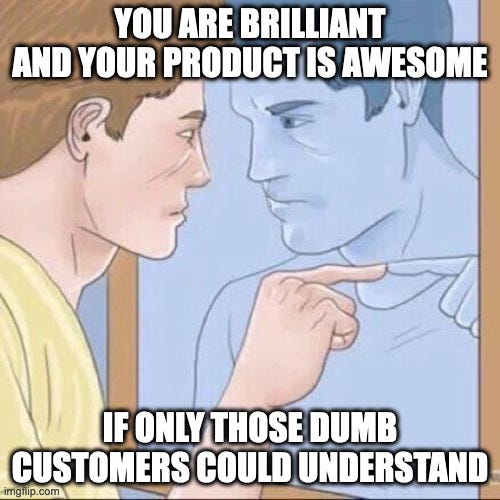The Misunderstood Genius & Product-market Fit
Imagine building a state-of-the-art product that nobody buys because they "just don't get it." Argh! Oh, the agony of being the misunderstood genius that fails at creating a successful business.
First, a true story.
Long before no-code solutions like Webflow went from a neat demo in 2015 to a 4 billion dollar company in 2022, I was in a meeting with one of its early power users. Let's call him Zack.
Zack scheduled a meeting with me and showed off a new way of building websites. After the presentation, I admitted that it was intriguing. However, it would completely change how we ran our business, and it felt like too much risk without a clear return on investment. So I said that I wasn't interested.
Zack got hostile. "Are you stupid? Don't you see this is the future? Are you willing to ignore this and put your company out of business?" Technically, he was right... eventually. 7 years later, I recommended a Webflow competitor (Bubble.io) to a Techstars startup. In less than 10 weeks, they used the platform to build an MVP that they used to raise over $4M.
Not bad! It was indeed the future of website development.
Unfortunately, Zack and his I-know-better tactics were off-putting to me. He continued to badger me over email until I told him to pound sand. What a bummer. My career path would have benefitted me by keeping up with the no-code industry. However, I wasn't willing to follow a condescending asshole, so I kept plugging along as usual.
And so it goes for many misunderstood geniuses out there.
Product Market Fit Requires Being Understood
Some are legitimate geniuses who can't translate their vision in a way others can understand. I knew dozens of people at MIT with off-the-chart IQs that couldn't explain-it-like-I'm-five (ELI5) to the layman. As a result, they struggled to get others to see what they could see... to buy into their vision of the future.
Achieving product-market fit in a startup is already hard enough. But, it's made so much more challenging if you can't tell a compelling story and speak to the problem/opportunity of the customer. Or if you can't help frame your solution in their own words and from their worldview. Or if you can't speak to the customer's most pressing wants/needs/values.
This misunderstood genius eventually becomes frustrated with this communication barrier. Sometimes, they turn this frustration into insults or ineffective coping mechanisms. "If only they could see what I see! But those dumb customers... they just don't get it!"
Meanwhile, people with clear communication of simpler solutions can have a much easier time gaining customers and traction in the market.
Sad Zack
As much as I disliked him, it was sad that Zack didn't capitalize on his grand vision. When I checked his LinkedIn profile a few years ago, I saw that his business ended before Webflow rocketed to its unicorn status. It's a shame. He was intelligent but early. He was right but repellant. He was correct but confusing.
Now, a bit of humility.
Sometimes, I'm like Zack. Sometimes I think something is clear as hell, and I fail miserably at creating an effective metaphor or using the right example to land a customer. I can see the confusion in their eyes, but I'm flailing at finding the right words. Sometimes I get frustrated (for a moment) that they can’t see what I see.
The difference is whether or not you blame them for not understanding or take ownership for not being unable to help them get to a place of understanding. Huge difference. The former will stall your progress. The latter will help you achieve resonance on the journey to product-market fit.


